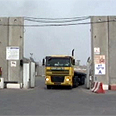
Gaza as a test case?
Op-ed: Demilitarized state would be viewed by Palestinians as continuation of their mistreatment
If Israel will allow for a freer movement of commodities and people in and out of Gaza in exchange for an Egyptian commitment to help to prevent the flow of arms to the coastal enclave, this would be an important test case for an old idea rarely discussed - that the Palestinian state will be a "non-militarized" one.
By far the most detailed case for a demilitarized Palestinian state is made in a document that received scant attention from most foreign policy analysts and even less from the media. The document "Israel's Critical Security Needs for a Viable Peace" carries an introduction by Vice Prime Minister Moshe Ya'alon and contains extensive presentations by several highly influential Israeli generals. It argues that the Israeli precept of demilitarization encompasses "a wider definition than is normally accepted or spelled out in international law - since the common term does not take into account the changing nature of military conflicts and threats."
According to the document, the precept includes: 1) The absence of any kind of Palestinian army or security force beyond what is needed for internal policing and security. 2) The Palestinian state would be prohibited from forming military alliances with other nations or conducting joint military exercises. 3) Any sort of military infrastructure would be banned. 4) The Palestinian airspace would be controlled by Israel. 5) Israel would control the electromagnetic spectrum. 6) The Israeli navy would have control of the sea and would have the ability to detain boats to prevent hostile activity and smuggling.
Some have suggested that foreign peacekeepers be deployed in the new Palestinian state to ensure its demilitarized status. For instance, Zbigniew Brzezinski and Brent Scowcroft suggested in a 2008 Washington Post op-ed that Israel's security concerns "could be dealt with by deploying an international peacekeeping force, such as one from NATO, which could not only replace Israeli security but train Palestinian troops to become effective."
Analysts point out that, at various points, both sides have agreed to at least some elements of demilitarization. The Declaration of Principles (9/93), the Gaza-Jericho Agreement (5/94) and the Interim Agreement (9/95) all contain statements to this effect. The 2000 Oslo Accords also included some concessions concerning demilitarization.
From a legal viewpoint, one can imagine two nations agreeing that one nation would be armed to the teeth and control the space of the other, while the other would have few arms and no military trappings. For a sociologist, it is hard to imagine that such an agreement would win the support of the population of the newly independent state, as the coming and going of all people and many goods would be scrutinized and controlled by the other state.
It is extremely rare for a national state to be demilitarized. The very precept of national sovereignty stipulates that a nation can conduct its internal affairs, including arming itself, in any way it prefers. The establishment of a truncated state would be viewed by many Palestinians as a continuation of their treatment as second-class citizens. One must also expect that large segments of the international community would pressure Israel to respect Palestinian sovereignty and allow the new state to modify or deviate from the restrictive agreement.
In contrast, if such an agreement could be made for Gaza, and if it would be basically honored - it would go a long way to reassure those who fear that the Palestinian state will turn into a Hamastan. Wait and see, but do not hold your breath, lest you turn blue.
Amitai Etzioni is a University Professor of International Relations at George Washington University and author of Hot Spots: American Foreign Policy in a Post-Human Rights World, published by Transaction.










